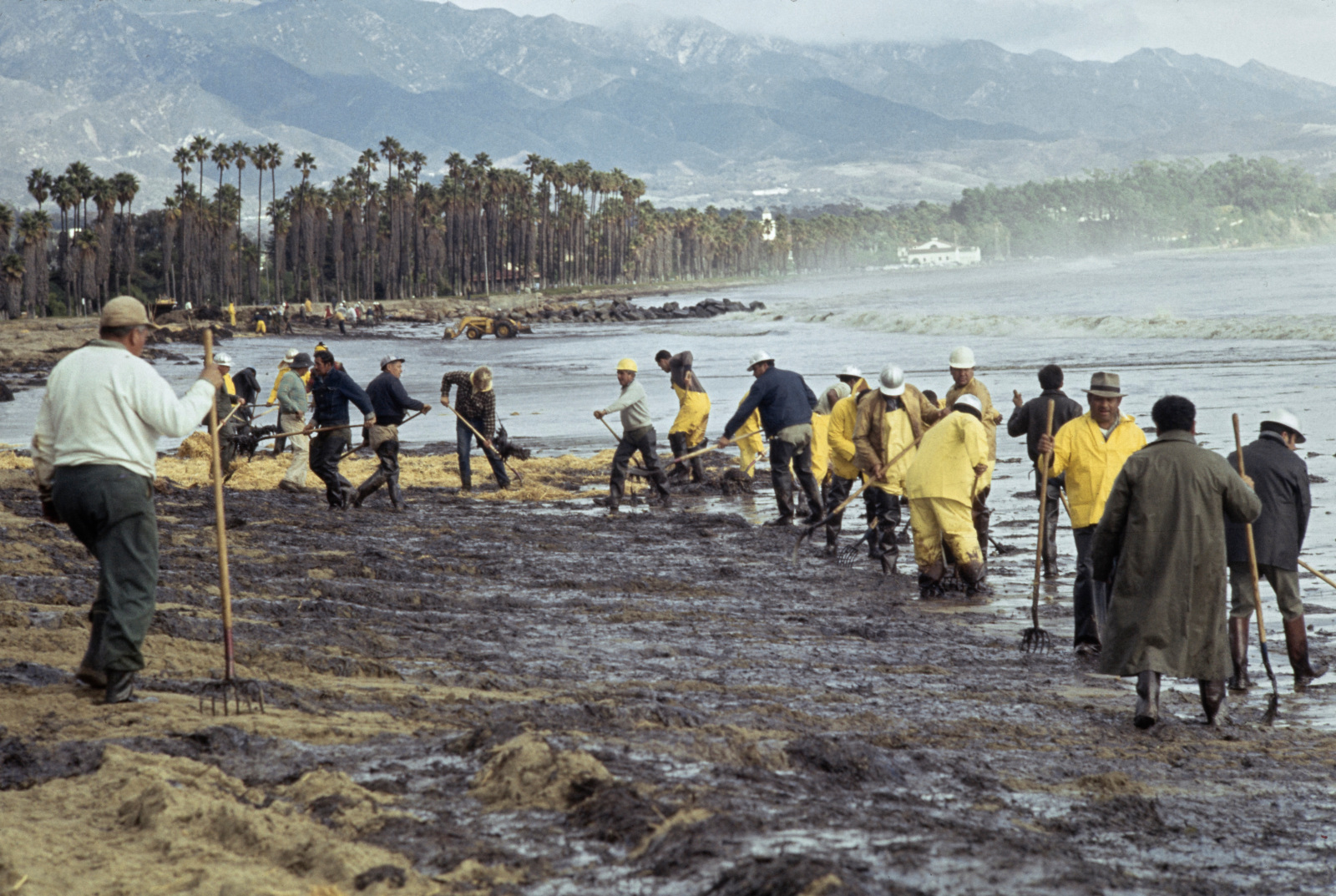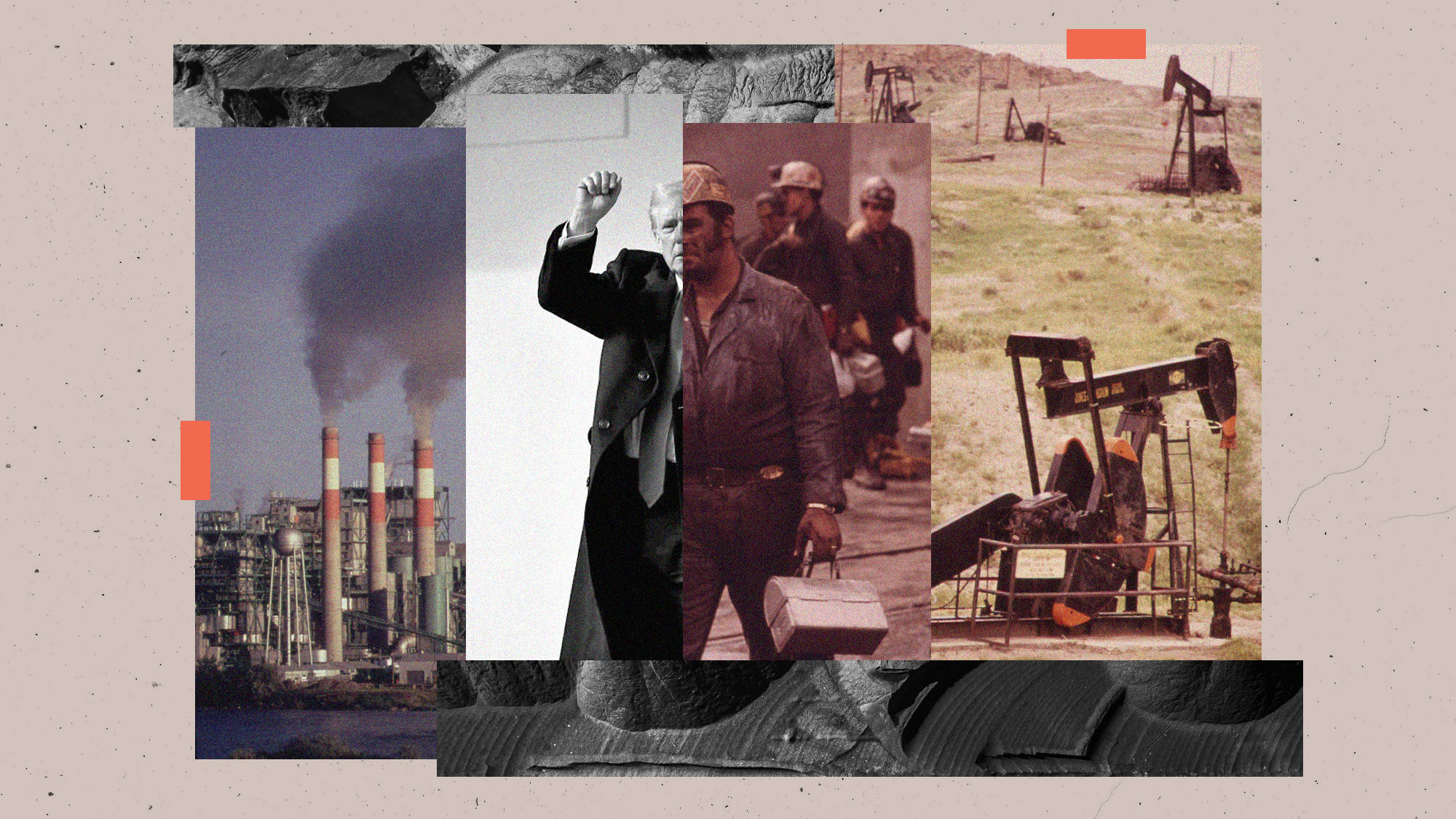When President Donald Trump signed an executive order declaring a “national energy emergency” hours after being sworn into office, something conspicuous was missing from his definition of energy. It consisted of a list of petroleum products, with nods to nuclear, biofuels, geothermal heat, and hydropower. There was no mention of wind or solar power, the fastest-growing sources of energy in the United States.
The omission begins to make sense when you consider Trump’s pitch to “Make America Great Again.” In his inaugural address on January 20, Trump was full of nostalgia for a bygone era, one in which solar panels and wind turbines didn’t yet exist. “America will be a manufacturing nation once again,” he said. “We will be a rich nation again, and it is that liquid gold under our feet that will help to do it.”
Trump’s speech tapped into a vein that runs as deep in American culture as the coal mines that fueled the country’s industrial rise. And it’s probably not a coincidence that the way he talks about energy, with another executive order on Inauguration Day aimed at “unleashing energy dominance,” sounds so macho. In fact, this kind of chest-beating reaction to industrial decline and climate change has a name: “petro-masculinity.”
“It’s part of this nostalgic vision of the past where America was awash in oil, and men were in charge, and patriarchy was less challenged than it is today,” said Elizabeth Carolyn Miller, a professor of English and gender studies at the University of California, Davis. Trump and Vice President J.D. Vance have bristled at how America has changed — wind turbines, “childless cat ladies” in positions of power, “diversity, equity, and inclusion” programs — and have reacted with a call to return to an idealized version of how things used to be.
The phrase “energy dominance” has created a puzzle for people trying to understand it as a realistic policy goal. “There isn’t a clear definition, so that’s the problem right off the bat,” said Emma Ashford, a senior fellow at Stimson Center, a foreign affairs think tank. The United States is already the largest oil producer in the world, with production reaching an all-time high last year under former President Joe Biden. There’s so much supply that hundreds of oil leases are sitting unused in the Gulf of Mexico.
“I strongly suspect that what the Trump folks are thinking when they say ‘energy dominance’ is that they want to be in a position where American energy lets them dictate to world markets or to other countries,” Ashford said. As examples, she pointed to Trump ending Biden’s pause on awarding permits to export liquefied natural gas and his recent threats to place tariffs on Canada and Mexico.
That emphasis on leverage aligns with a definition proposed by the energy security expert Joseph Majkut: “holding a strong economic and geopolitical hand by producing and strategically using high-value energy resources to secure domestic energy needs and drive influence in global markets.” Noah Kaufman, an economist at Columbia University, considered serious definitions like Majkut’s, but thought that the phrase “energy dominance” had so many cultural associations that no simple definition could capture it. “I have come back to believing this is really about vibes,” Kaufman said.
Ricky Carioti / The Washington Post via Getty Images
Trump started talking about “energy dominance” during his presidential campaign in 2016, alongside wishful promises to bring back coal. “That language does have this bravado and machismo that is important to his movement,” said Cara Daggett, a professor of political science at Virginia Tech University. “This is very much about a performance of strength in a world that feels increasingly out of control.” Daggett first identified the connection between Trump’s anti-feminist and pro-oil rhetoric in 2018, when she proposed the theory of “petro-masculinity” to describe, in part, how rising authoritarian movements invoke fossil fuels to appeal to men who feel left behind.
If anything, those anxieties have only become more evident since then, Miller said, “with all of these billionaires like Elon Musk and Zuckerberg kind of falling over themselves to echo Trump on gender and on energy.” In January, Mark Zuckerberg, Meta’s CEO, lamented that corporate culture was moving away from “masculine energy” on Joe Rogan’s podcast, saying it would be good to have “a culture that, like, celebrates the aggression a bit more.”
Fossil fuels have been tied up with romantic ideas about sweaty, strenuous work since at least the Industrial Revolution. Many states had prohibitions against women working underground in mines, modeled after a British law from 1842, giving the profession a “very gendered quality” that was distinctive from other industrial jobs, Miller said. Upon observing coal miners at work in 1937, the author George Orwell wrote that it was impossible to watch them “without feeling a pang of envy for their toughness,” comparing the workers to “iron-hammered iron statues.”
Starting with the discovery of the gushing geyser that led to the Texas oil boom in 1901, fossil fuels gained another connotation — bringing “not just profit, but freedom and a kind of exuberant creativity to the world,” according to Stephanie LeMenager, an English professor at the University of Oregon who wrote a book about oil’s cultural resonance. But the sense of optimism that cheap petroleum inspired — associated with the freedom to drive around in automobiles — started to collapse in 1969, LeMenager said. That year, a huge oil spill in Santa Barbara left beaches littered with thousands of dead, crude-slicked birds, making the damages caused by oil extraction more apparent. Soon thereafter, the oil crisis of 1973 sent once-stable gasoline prices climbing.
LeMenager uses the word “petro-melancholia” to describe this grieving for the dream of what oil promised. “I think Trump is really good at tapping into the cultural unconscious, at least of some Americans,” she said. “And my sense is that ‘energy dominance’ is a deliberately vague term that’s meant to evoke a cluster of feelings.”

UPI/Bettmann Archive / Getty Images
There may also still be a lingering sense that the United States doesn’t have enough domestic fuel, imprinted during the 1973 crisis when OPEC countries banned oil exports to the United States because of its support for Israel in the Yom Kippur War. Gas prices quadrupled, and people waited to fill up their cars in lines that wrapped around the block.
“Everybody has been talking about ‘energy independence’ since probably the Jimmy Carter era,” said Travis Fisher, the director of energy and environmental policy studies at the libertarian think tank Cato Institute. That terminology is now out, along with the sense of isolationism it upheld, he said. To Fisher, ‘energy dominance’ communicates the message: “We shouldn’t only seek to supply ourselves. We should supply the world.”
Daggett argues that the way that right has responded to climate change — with defiance — reflects a more realistic grasp of what abandoning fossil fuels would entail than many on the left are willing to reckon with.
“If you actually understand the magnitude of the climate crisis, it is a threat to ways of life that characterize one version of the American dream — suburbia, dependence on cars, mass consumerism,” Daggett said. “To respond to it is to have to develop new ways of life, new ways of organizing ourselves. And the right, in some sense, has recognized the existential nature of the climate crisis, and therefore the reaction is really strong. And the reaction is to say, ‘No, I refuse that. I refuse that I have to change this way of life. I want this way of life, and I’m going to defend it.’”
Even if Americans aren’t anywhere close to giving up their cars, LeMenager has seen hints that people could embrace new possibilities instead of falling into the trap of petro-masculinity. Last year, she drove an electric vehicle across the country and met people at charging stations along the way, some of whom she suspected were Trump voters. One man said to her, “We’re living in such a remarkable time.” She waited to see what he meant, and he continued, “It’s like we’re at the dawn of the 20th century, and we’re seeing an energy transition.’”
To LeMenager, it was a sign that people could get excited about moving forward — even those who might not be excited about the idea of a Green New Deal.
Source link
Kate Yoder grist.org


